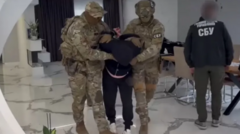China's President Xi Jinping appears to bolster ties with Russia's Vladimir Putin, yet must tread carefully to avoid international isolation.
Xi Jinping's Balancing Act: Strengthening Ties with Putin Without Overcommitting

Xi Jinping's Balancing Act: Strengthening Ties with Putin Without Overcommitting
Amidst military parades and public displays, Xi and Putin navigate a complex geopolitical relationship.
In a show of camaraderie, Chinese President Xi Jinping joined Russian President Vladimir Putin at Moscow's Victory Day parade, taking a prominent position at his side. This moment reflected a strong public image of friendship, underscoring Xi's remark that the bond between the two nations is "unbreakable" and that they should be "friends of steel." This marks Xi's eleventh trip to Russia since assuming the presidency in 2013, with both leaders having met over 40 times, including plans for Putin's upcoming autumn visit to China.
However, analysts caution against oversimplifying this relationship. Mathieu Boulegue from the Center for European Policy Analysis notes that the partnership can appear both cooperative and competitive, revealing a deeper complexity in their interactions. While there are notable displays of solidarity, the essence of their alliance may not be as strong as it seems.
Despite the symbolism, Xi Jinping finds himself delicately balancing China's strategic partnership with Russia while cautious of Western perceptions, particularly as Putin's actions in Ukraine have turned Russia into a global pariah. Beijing must be mindful of its relationships with other potential partners, especially as it competes with the economic might of the United States. Signs of Xi's outreach to Europe are present, exemplified by recent communications with European Commission President Ursula von der Leyen and European Council President António Costa, celebrating 50 years of EU-China relations.
While China abstains from condemning Russia's military aggression, it still calls for an end to the crisis, revealing the challenges Beijing faces. A close association with Moscow could jeopardize Beijing's efforts to foster international partnerships, particularly in Europe. Xi's relationship with Trump is also at stake, as he seeks to demonstrate that efforts to drive a wedge between China and Russia will not succeed.
Both leaders aspire to challenge what they view as U.S. dominance and pave the way for a new world order, yet Xi is acutely aware that while China boasts superpower status, Russia's influence is waning. The ongoing war in Ukraine has severely impacted the Russian economy and increased its reliance on Chinese support, contributing to a power dynamic that favors Beijing.
As Xi and Putin presented a united front at the parade, there are underlying tensions and potential rifts that could emerge in the future. The complex geopolitical landscape highlights the challenges Xi faces in nurturing a friendship with Russia while ensuring that it does not diminish China's standing on the global stage.
However, analysts caution against oversimplifying this relationship. Mathieu Boulegue from the Center for European Policy Analysis notes that the partnership can appear both cooperative and competitive, revealing a deeper complexity in their interactions. While there are notable displays of solidarity, the essence of their alliance may not be as strong as it seems.
Despite the symbolism, Xi Jinping finds himself delicately balancing China's strategic partnership with Russia while cautious of Western perceptions, particularly as Putin's actions in Ukraine have turned Russia into a global pariah. Beijing must be mindful of its relationships with other potential partners, especially as it competes with the economic might of the United States. Signs of Xi's outreach to Europe are present, exemplified by recent communications with European Commission President Ursula von der Leyen and European Council President António Costa, celebrating 50 years of EU-China relations.
While China abstains from condemning Russia's military aggression, it still calls for an end to the crisis, revealing the challenges Beijing faces. A close association with Moscow could jeopardize Beijing's efforts to foster international partnerships, particularly in Europe. Xi's relationship with Trump is also at stake, as he seeks to demonstrate that efforts to drive a wedge between China and Russia will not succeed.
Both leaders aspire to challenge what they view as U.S. dominance and pave the way for a new world order, yet Xi is acutely aware that while China boasts superpower status, Russia's influence is waning. The ongoing war in Ukraine has severely impacted the Russian economy and increased its reliance on Chinese support, contributing to a power dynamic that favors Beijing.
As Xi and Putin presented a united front at the parade, there are underlying tensions and potential rifts that could emerge in the future. The complex geopolitical landscape highlights the challenges Xi faces in nurturing a friendship with Russia while ensuring that it does not diminish China's standing on the global stage.





















